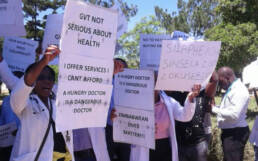
CWGH | The Zimbabwe Hospital Doctors Association (ZHDA) members, a constituency of junior and middle level doctors, have been in a state of incapacitation since the 3rd of September 2019. The ZHDA has been waging a spirited campaign to call for the improvement of working conditions for health workers in Zimbabwe.
The Doctors are now back at work after the intervention of a humanitarian organization that is topping up their salaries for the next 6 months but the impact of the strike has been devastating in terms of human suffering and deaths of patients as ordinary citizens could not access medical help in the country’s public health institutions. The doctors stopped going to work on 3 September 2019 until mid-January 2020 citing incapacitation due to poor remuneration and absence of tools of their trade for the provision of even rudimentary health care service. They said they had patients at heart but no means to help them.
They only returned to work after a philanthropist, Higher Life Foundation offered to pay part of their salaries to top-up the paltry pay they get from government. But that top-up will end in the next few months, pointing to another stand-off soon if the government does not devise an alternative and sustainable plan to cater for the welfare of doctors. In the meantime, equally economically hard-pressed nurses are demanding that they also be given a similar package like that of doctors or they also down tools.
Doctor’s incapacitation and the flexi working hours by nurses caused untold suffering to the general public, especially the ordinary majority poor who rely on the public health delivery system to access health care services. Many critical-ill patients, in need of emergency health care services including surgeries and blood transfusion, were turned away from hospitals. In great pain, they were transported back home by relatives and friends to wait for fate to take its course. Sadly, many did not last to see the next day. They perished.
Some families sold all household goods and livestock in desperate attempts to save their loved ones. This left many families poorer, and at times children dropped out of school, after their struggling parents sold the little assets they had in an attempt to save their loved ones by seeking for health care services in the unaffordable private health institutions.
People with chronic diseases like diabetes and other Non-communicable diseases (NCDs), apart from struggling to meet costs of their treatment, were completely shut out from medical care while those living with HIV/AIDS failed to access their antiretroviral (ARVs), either because the drugs were not in stock or there was no one to dispense them.
Nurses, who are equally incapacitated, are now working flexible hours — two or three days a week — leaving patients unattended for a long time. This new system also puts patients at risk and compromising the quality of care. This is worsened by the fact that the health system is already short-staffed and that the country has not properly revised its staff establishment since 1983 despite the growing population and increasing disease burden.
Although some doctors are back at work, the situation in the country’s hospitals is still far from normal. The Zimbabwe Hospital Doctors’ Association (ZHDA) said incapacitation had driven hundreds of doctors and nurses out of the country in search of greener pastures. This is sad for a country which already has inadequate health personnel.
The Community Working Group on Health (CWGH) was requested by the doctors and their employer the Health Services Board (HSB) to facilitate dialogue as a neutral mediator. As the Facilitator and Mediator we initially met separately with the Executive Committee of the doctors and their employer the Health Services Board (HSB) to kick start the dialogue process whilst building trust and confidence between the two parties, we then finally brought them together to a round table discussion where the doctors presented a position paper outlining their demands.
Whilst the negotiations and dialogue were ongoing, the government instituted the disciplinary hearings and The Health Services Board fired the doctors after holding disciplinary hearings which the striking doctors did not attend, more than half of the (1600) doctors were fired for missing five or more days of duty, as they were arguing that disciplinary hearings and subsequent dismissals will not solve the current impasse in the health sector. The fired doctors, some of whom were staying in hospital accommodation were given notice to vacate the premises whilst their salaries were stopped.
We continue to urge genuine and honest dialogue as the perennial strike actions by doctors have caused untold suffering of patients and even deaths that could have been avoided under normal circumstances. While we acknowledge the genuine grievances of the doctors and the financial position of government, we would like to urge the two parties to put patients at the centre of their focus to save lives and suffering.
While it is factual that the economy has left the employer unable to fulfil obligations or address employees’ concerns, we would like to encourage the government to seriously consider non-cash incentives to retain health workers and boost their morale. Dialogue is the only way that can resolve the long standing impasse and rebuild the broken public health delivery system to functionality again if the country is to move towards attaining universal health coverage because strengthening national health systems cannot be done without valuing our health workers.
………………..
The Community Working Group on Health (CWGH) is a network of national membership based civil society and community-based organisations who aim to collectively enhance community participation in health in Zimbabwe.
Authors: Itai Rusike & Caiphas Chimhete
Contribution to the Annual Report 2019 of the MMI Network
